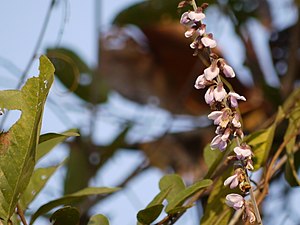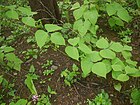Note: This is a project under development. The articles on this wiki are just being initiated and broadly incomplete. You can Help creating new pages.
Difference between revisions of "Pueraria tuberosa - Vidarikanda"
(→External Links) |
(→List of Ayurvedic medicine in which the herb is used) |
||
| Line 46: | Line 46: | ||
==List of Ayurvedic medicine in which the herb is used== | ==List of Ayurvedic medicine in which the herb is used== | ||
| − | + | * [[Vidaryadyasava]] | |
| + | * [[Amritaprasha ghrita]] | ||
| + | * [[Prasootikamrita lehya]] | ||
| + | * [[Gopichandanadi gulika]] | ||
| + | <ref name="Ayurvedic preparations"/> | ||
==Where to get the saplings== | ==Where to get the saplings== | ||
Revision as of 12:14, 12 June 2019
Vidarikanda is a large climber with trifoliate leaves and tuberous roots. It occurs in the Himalayan tracts at low elevations and also in the hills of Central and South India.
Contents
- 1 Uses
- 2 Parts Used
- 3 Chemical Composition
- 4 Common names
- 5 Properties
- 6 Habit
- 7 Identification
- 8 List of Ayurvedic medicine in which the herb is used
- 9 Where to get the saplings
- 10 Mode of Propagation
- 11 How to plant/cultivate
- 12 Commonly seen growing in areas
- 13 Photo Gallery
- 14 References
- 15 External Links
Uses
Joint pain, Burning sensation, Improve bodymass, Skin complexion, Improve voice quality [1]
Parts Used
Chemical Composition
Common names
| Language | Common name |
|---|---|
| Kannada | bhoochakra gedde, nela gumbala balli |
| Hindi | bidarikand, bilaikand, dhodhala, ghora-bel, vidarikand |
| Malayalam | mutukku, palmutukku |
| Tamil | Nelapoosani |
| Telugu | darigummadi, |
| Marathi | NA |
| Gujarathi | NA |
| Punjabi | NA |
| Kashmiri | NA |
| Sanskrit | bhukushmandi, kandapalasah, payasvini, shrigalika, vidarikanda |
| English | Indian kudzu |
Properties
Reference: Dravya - Substance, Rasa - Taste, Guna - Qualities, Veerya - Potency, Vipaka - Post-digesion effect, Karma - Pharmacological activity, Prabhava - Therepeutics.
Dravya
Rasa
Madhura (Sweet)
Guna
Guru (heavy), Snigdha (Slimy)
Veerya
Sheeta (cold)
Vipaka
Karma
Pitta, Vata
Prabhava
Habit
Identification
Leaf
| Kind | Shape | Feature |
|---|---|---|
| Trifoliate | alternate | leaflets 5-18 x 5-12.5 cm, ovate or the terminal rhomboid, base obtuse or acute, laterals oblique at base, apex acuminate, scattered hairy above, appressed hairy beneath; lateral nerves 7 or 8 pairs, reticulations prominent; petiole to 18 cm long; stipules c. 5 mm long, ovate. Racemes axillary, 15-35 cm long; rachis silky. |
Flower
| Type | Size | Color and composition | Stamen | More information |
|---|---|---|---|---|
| Bisexual | Raceme | Bluish purple | 10 | Flowers c. 1.3 cm long, bluish-purple, ternate on the nodes of racemes; pedicels c. 3 mm long. Calyx c. 7 mm long, tomentose; tube campanulate; lobes ovate. Standard c. 1.2 cm, long, orbicular, base auricled, apex emarginate; wings c. 1.2 cm long, with spur above base; keels long-clawed. Stamens 9+1, vexillary stamen apically fused, free at base. Ovary to 8 mm long, oblong, densely brown-hirsute; style incurved; stigma capitate. |
Fruit
| Type | Size | Mass | Appearance | Seeds | More information |
|---|---|---|---|---|---|
| A Pod | 2.5-5.5 x 0.5-0.6 cm | Linear and hairy | {{{6}}} |
Other features
List of Ayurvedic medicine in which the herb is used
Where to get the saplings
Mode of Propagation
How to plant/cultivate
Season to grow
Soil type
Propagation
Commonly seen growing in areas
Tropical area, Sub tropical area
Photo Gallery
References
- ↑ "Uses"
- ↑ "Vernacular names"
- ↑ PLANTS OF KERALA VER.2, N. Sasidharan "BOTANIC DESCRIPTION"
- ↑ Cite error: Invalid
<ref>tag; no text was provided for refs namedAyurvedic preparations
External Links
Categories:
- Pages with reference errors
- Ayurvedic Herbs known to be helpful to treat Joint pain
- Ayurvedic Herbs known to be helpful to treat Burning sensation
- Ayurvedic Herbs known to be helpful to treat Improve bodymass
- Ayurvedic Herbs known to be helpful to treat Skin complexion
- Ayurvedic Herbs known to be helpful to treat Improve voice quality
- Herbs with Tuber used in medicine
- Herbs with common name in Kannada
- Herbs with common name in Hindi
- Herbs with common name in Malayalam
- Herbs with common name in Tamil
- Herbs with common name in Telugu
- Herbs with common name in Sanskrit
- Herbs with common name in English
- Habit - Climber
- Index of Plants which can be propagated by Seeds
- Index of Plants which can be propagated by Cuttings
- Herbs that are commonly seen in the region of Tropical area
- Herbs that are commonly seen in the region of Sub tropical area
- Herbs
- Fabaceae
- Ayurvedic herbs that don't have seed photos




